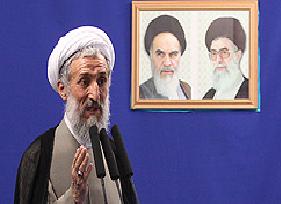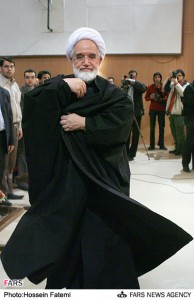
2045 GMT: Political Prisoner Watch. It is reported that detained journalist Mehdi Mahmoudian, who helped expose the Kahrizak Prison abuses,
has been taken to hospital in handcuffs.
2040 GMT: The Silenced Reformists? The Government may be putting out the story of the recommendation by "watchdogs" that reformist political parties shoud be banned. However, members of Parliament haven't suspended their criticisms.
Iran Document: The Speech Khatami Would Have Given at Japan Disarmament Conference
Iran Document: “Our Sons’ And Daughters’ Agony” (Sahabi)
The Latest from Iran (19 April): Stay Firm, Spread the Word
Dariush Ghanbari
has said that the Government must pursue a reform of the media law and that rulers must recognize the opposition's rights to political activity.
Mostafa Kavakebian
has asked why the regime only shuts down newspapers that are critical of the Government, while Jamshid Ansari
criticises "parallel" intelligence services, saying that one makes arrests while the other remains uninformed.
2035 GMT: Today's Video Moment. A video has emerged of
the Iranian New Year meeting of women's rights activists with Zahra Rahnavard, the prominent activist, academic, and wife of Mir Hossein Mousavi. ()
The video comes out as the Government announces
a plan to create a "Women's Ministry".
2030 GMT: Seeking the Help of Clerics. Rah-e-Sabz writes that a report on torture in Iranian prisoners has been passed in
an open letter to marja (senior clerics).
2015 GMT: Guess Who's Waiting for Mir Hossein? It's not unusual to see the question, "Will Mousavi's Green Manifesto be published soon?" After all, the the way forward for the Green Movement is a top subject of discussion.
It is a bit different, however, when
the question is being asked by Ali Larijani's Khabar Online.
2000 GMT: Political Prisoner Watch. Even if a detainee is freed, his encounter with Iranian authority may be far from over. Green Voice of Freedom reports that the family of Iranian-Canadian journalist Maziar Bahari, who was imprisoned for months after the election,
has been threatened.
1955 GMT: Academic Corner. The
suspension or expulsion of "troublesome" professors, which we have followed in update, is summarised by Green Voice of Freedom.
1545 GMT: We'll be on an extended break today. Thanks to all readers for continuing to bring in news and comment.
1215 GMT: Breaking the Opposition? Following the recommendation by Iranian "watchdogs" for the suspension of two major reformist parties and the banning of
Bahar newspaper, pro-Ahmadinejad MPs have maintained pressure. Ali Abbaspour
has declared that Mir Hossein Mousavi and Mehdi Karroubi have not stopped treasonous activities, while
Ruhollah Hosseinian said the post-election role in "fitna" (sedition) by the Islamic Iran Participation and the Mojahedin of Islamic Revolution justified their dissolution.
However, in a sign that not all may be running one way, Hosseinian
was not present at yesterday's meeting of clerical MPs with the Supreme Leader.
1205 GMT: The Subsidy Battle. Despite reports of a settlement between Parliament and the Government over subsidy cuts and spending proposals, there is still some confusion over what exactly will be implemented.
Pro-Ahmadinejad MP Iraj Nadimi has insisted that all is settled but chided reporters not to ask questions such as when when the cuts will start.
In that context, readers can interpret
the latest statement of Speaker of Parliament Ali Larijani that the Government must enforce laws passed by the Majlis.
1200 GMT: A car bomb in Ilam has killed at least three people.
[youtube]http://www.youtube.com/watch?v=Xq_XPVPcyK8&feature=youtube_gdata[/youtube]
1130 GMT: Politics, Rights, and Deportation. Bita Ghaedi, an Iranian women who
fled to Britain because of alleged domestic violence, is
due to be deported today, despite fears of how she will be treated upon her return to Iran. Activists are publicising her case,
protesting in London yesterday.
Beyond the bureaucratic procedures of Britain's Home Office, Ghaedi's case is complicated by her participation in a rally in summer 2009 over the treatment of Iranian residents of Camp Ashraf in Iraq. Most of those residents are connected with the People's Mujahedin Organization of Iran, the political wing of the Mujahedin-e-Khalq (MKO) who have sought the overthrow of the Islamic Republic for more than 30 years.
For the moment, Ghaedi's deportation is held up because of a twist beyond politics: UK flights to Iran are grounded because of the ash cloud from last week's volcanic eruption in Iceland.
1040 GMT: The Uranium Swap Talks Are On?
Agence France Presse reports on the visit of Turkish Foreign Minister Ahmet Davutoglu to Tehran (see 1000 GMT):
Davutoglu...said that Turkey, which has resisted a US push for a fourth round of sanctions against Iran, "is ready to act as an intermediary in the issue of uranium exchange as a third country and hopes to have a fruitful role in this. We will continue to try our best to see what we can do for this nuclear fuel swap."
And Press TV, after its initial PR focus on Turkish support for Tehran, has now
gotten to the heart of the matter, thanks to Iranian Foreign Minister Manouchehr Mottaki: "We think that if the other sides have this real will to materialize this nuclear fuel deal then this swap can be a multilateral confidence building for all sides including the Islamic Republic of Iran." (Curiously AFP misses the signal, claiming that Mottaki "did not explicitly react to Ankara's latest offer".)
1030 GMT: Academic Corner. Students at Elm-o-Sanat University in Tehran
have written an open letter in support of lecturers who have been suspended from teaching.
1000 GMT: A quiet start to the day. We're now far enough away from the Washington and Tehran showpieces on nuclear disarmament for the often-diversionary headlines to fade, even though the real stories are still there to be evaluated.
For example, in Iran,
Press TV's press release on Turkish Foreign Ahmet Davutoglu's visit --- "Turkey has always supported Iran's stance when it comes to the nuclear program" --- fails to approach the interesting questions about his discussions with Iranian counterpart Manouchehr Mottaki.
Given Turkey's persistent role in the uranium talks as broker and intermediary, do the talks point to a serious renewal of negotiations on a swap of uranium and possible "third party enrichment"? Press TV only offers, "On a UN-backed deal that would provide fuel for Tehran's research reactor, the top diplomat said that Turkey would be willing to act as a mediator and Ankara would 'do its best' to see what it could do for the fuel swap."
In the US, the curious aftermath lingers after this weekend's fuss over Secretary of Defense Robert Gates' three-page memorandum on US policy towards Iran. Unnamed officials used
The New York Times to argue that the Secretary of Defense was blasting the Obama Administration for being indecisive and that he was looking towards military "containment" of Tehran.
Gates has
quickly repudiated the claims: "
The New York Times sources who revealed my January memo to the National Security Advisor mischaracterized its purpose and content."
Fine, but what exactly did Gates say in that memo to the head of the National Security Council, James Jones, if he wasn't criticising an Obama policy caught between sanctions, discussions with Iran, and the US military presence in the Persian Gulf? And who, if the Secretary of Defense is correct, was trying to misrepresent him through a Page 1 story? (Or the alternative: is Gates trying to back away, at least in public, from concerns that were in fact "correctly" expressed in the leak to the
Times?)
 Wednesday, April 21, 2010 at 12:06
Wednesday, April 21, 2010 at 12:06  I leave it to readers to interpret the significance in this tale of modern journalism:
I leave it to readers to interpret the significance in this tale of modern journalism:




